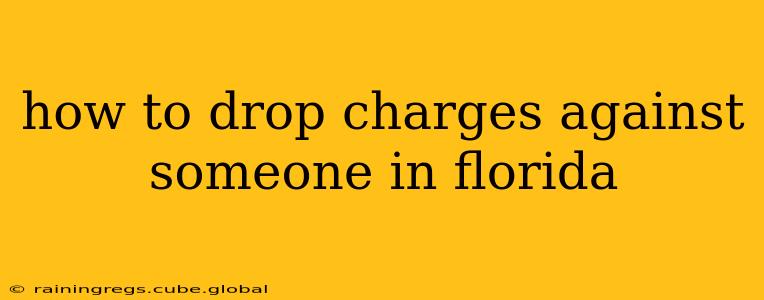How to Drop Charges Against Someone in Florida
Dropping charges against someone in Florida isn't a simple process and depends heavily on the specifics of the case. Unlike in some situations where a victim can simply withdraw a complaint, the decision to drop charges rests primarily with the prosecuting attorney, not the victim. This article will explore the nuances of this process.
What Types of Charges Are We Talking About?
The process of dropping charges differs significantly depending on the nature of the accusations. We'll break it down into categories:
-
Misdemeanors: These are less serious crimes. While a victim's statement can influence the prosecutor's decision, the prosecutor ultimately decides whether to pursue the case. A victim's willingness to cooperate, or lack thereof, is a key factor.
-
Felonies: These are serious crimes. The victim's role in influencing the decision to drop felony charges is even less direct than with misdemeanors. Prosecutors carefully weigh evidence and public interest before making a decision.
-
Civil Cases: These involve disputes between individuals or entities, not criminal charges. Here, the plaintiff (the person filing the suit) can generally drop the charges. However, there may be legal ramifications depending on the stage of the case.
Can a Victim Drop Charges in Florida?
The short answer is: Not directly. While a victim's statement is crucial to the case, it doesn't automatically determine whether charges are dropped. The prosecutor's office evaluates various factors, including:
- The victim's testimony: Their willingness to testify, their consistency in statements, and the credibility of their account are all considered.
- Evidence: The prosecutor needs sufficient evidence to proceed with the case. Even if the victim wants to drop the charges, a strong case may lead to the prosecution continuing.
- Public interest: Some crimes, regardless of the victim's wishes, are pursued due to public safety concerns. This is especially true in cases involving domestic violence, child abuse, or other serious offenses.
- Witness cooperation: The reliability and willingness of other witnesses to testify are important.
What Happens If the Victim Doesn't Want to Prosecute?
If a victim refuses to cooperate or wishes to drop the charges, the prosecutor may:
- Drop the charges: If the victim's testimony is crucial and their lack of cooperation weakens the case significantly, the prosecutor may dismiss the charges.
- Proceed with the case: If enough evidence exists independent of the victim's testimony, the prosecutor might proceed with the case.
- Offer a plea bargain: This is a negotiation where the defendant pleads guilty to a lesser charge in exchange for a reduced sentence.
How to Influence the Prosecutor's Decision
While you can't force a prosecutor to drop charges, you can influence their decision by:
- Contacting the prosecutor's office: Explain your reasons for wanting the charges dropped clearly and respectfully. Provide any relevant information that might affect their decision.
- Providing written documentation: Supporting statements, letters, or other relevant documentation can be helpful.
- Hiring an attorney: A skilled attorney can advocate on your behalf and help navigate the legal process.
What if the Charges Involve a Minor?
In cases involving minors, child protective services and the Department of Children and Families (DCF) usually play a significant role. Dropping charges in such cases is even more complex and often requires the involvement of legal professionals specializing in family law and juvenile justice.
Disclaimer: This information is for general knowledge and educational purposes only, and does not constitute legal advice. The specifics of each case are unique, and seeking advice from a qualified Florida attorney is crucial for navigating the legal complexities involved in dropping charges. This article should not be considered a substitute for professional legal counsel.
